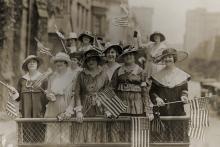19th amendment

“In my ideal society, we would vote as households,” a pastor tells CNN. “And I would ordinarily be the one that would cast the vote, but I would cast the vote having discussed it with my household.”
Another agrees, saying he’d back an end to a woman’s right to vote: “I would support that, and I’d support it on the basis that the atomization that comes with our current system is not good for humans.”
The discussion of 19th Amendment rights was part of a news segment focused on Doug Wilson — a self-proclaimed Christian nationalist pastor based in Idaho — that was reposted to X by Defense Secretary Pete Hegseth. The secretary is among Wilson’s supporters, and his involvement with Wilson’s denomination highlights how a fringe conservative evangelical Christian belief system that questions women’s right to vote is gaining more traction in the Republican Party.

I've done it in booths at a New York City public school, and the 92nd Street Y. I've done it on a small, enclosed counter in DC. But you never forget the first time you voted.
My first time at the polls was not particularly spectacular — it was an off-year for elections, so I voted on a referendum. Since then I have voted every year except twice. Once was on another off-year — I was in grad school for public administration and had to finish a statistics assignment. And for the other, I’d just become a DC resident, too late to vote in the special election that year.
In case it’s not obvious, voting is important to me, and I’m kind of a dork about it. And when I consider the hard fight for women’s suffrage, I feel that the best way to honor the women who fought hard for that right is to responsibly exercise it.
So it’s disheartening to hear women say that they don’t really pay attention to politics or take the time to vote. And as a DC resident whose interests are determined by the legislators of other states, it’s hard to watch anyone take for granted their right to vote.

I’m tired of reading blogs from my White Christian brothers about why they are choosing to vote. There. I said it.
I’m all for being a part of the democratic process, but it seems a bit odd to me that so many of these bloggers are coming from a position of power and privilege they themselves have always had. It seems a bit arrogant to choose something that was always theirs.
The way I see it, they had better vote. The vote of the White male is what finally allowed people like me – a woman, an immigrant, a non-native English speaker – to have the right to vote. I didn’t have a voice. I didn’t matter. Neither did my ancestors, who immigrated here under quota systems developed by people in power for the benefit of the country and the powers-that-be.
And there still are people who have no voice, who have no right to vote, but they are directly impacted by the politicians, referenda, judges, and local officials as well as the “agendas and policies.” As a Christian who is new to the process, its a privilege and responsibility I don’t take lightly because it isn’t a given. I’m not American born. We are not post-racial America, and the fact of the matter is the church isn’t either. We are working on it, but we aren’t there.
Did you know that in 1882 Congress passed the Chinese Exclusion Act denying citizenship and voting rights to Chinese Americans? Yup, they could build the railroads but they can’t vote.
Monday marked the 93rd anniversary of the congressional passage of the 19th Amendment to the Constitution on June 4, 1919.
After 71 years of movement forward and pushes back, the proposed Amendment to guarantee every woman in the United States the right to vote prevailed in the Senate. But it still had 36 more hurdles to jump before ratification; 36 of the then 48 states had to pass the Amendment in their state legislatures. On August 18, 1920 Tennessee became the 36th state to pass the Amendment and on that day women’s suffrage became the law of the land.
Florida missed that boat. The sunshine state had never voted on the 19th Amendment before it was ratified. A year later, the Florida state legislature passed its own law guaranteeing the vote to all citizens, but Florida’s legislature didn’t actually ratify the 19th Amendment until it took a symbolic vote in 1969.
As a woman I am grateful for the fact that in 1969 someone thought it might be a good idea to at least symbolically say, “Yeah, man, we’re cool with the ladies voting. We can groove with that.” But the current news about Florida’s voter purge has me wondering what happened in the 43 years between Florida’s symbolic thumbs up for suffrage and today’s current voter suppression?
The answer: The year 2000 happened.

One in 5 women have been raped in their lifetime and nearly 1 in 4 women have been victims of severe physical violence by an intimate partner.
Mothers, daughters, sisters, wives and partners physically, emotionally and spiritually violated.
This is a moral shame not just on the men who committed these crimes but on ALL men.
It wasn’t until 1920 that the 19th Amendment to the Constitution of the United States was ratified. It reads:
The right of citizens of the United States to vote shall not be denied or abridged by the United States or by any State on account of sex.
Congress shall have power to enforce this article by appropriate legislation.
Men in this country live with a legacy of viewing and treating women as less than human. Our past reveals that we have not always recognized the image of God as fully present in our sisters.
While not every man has committed a crime of violence against women, all men are responsible to make sure such crimes end. The statistics show that rape and assault are not isolated incidents but rather are a consistent and constant part of our society and culture.
It won’t end the crisis, but the Violence Against Women Act (VAWA), is an important tool, giving an avenue of response to women who have been victimized.